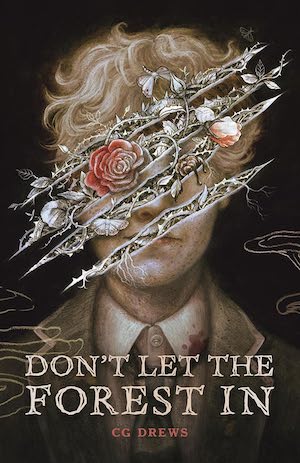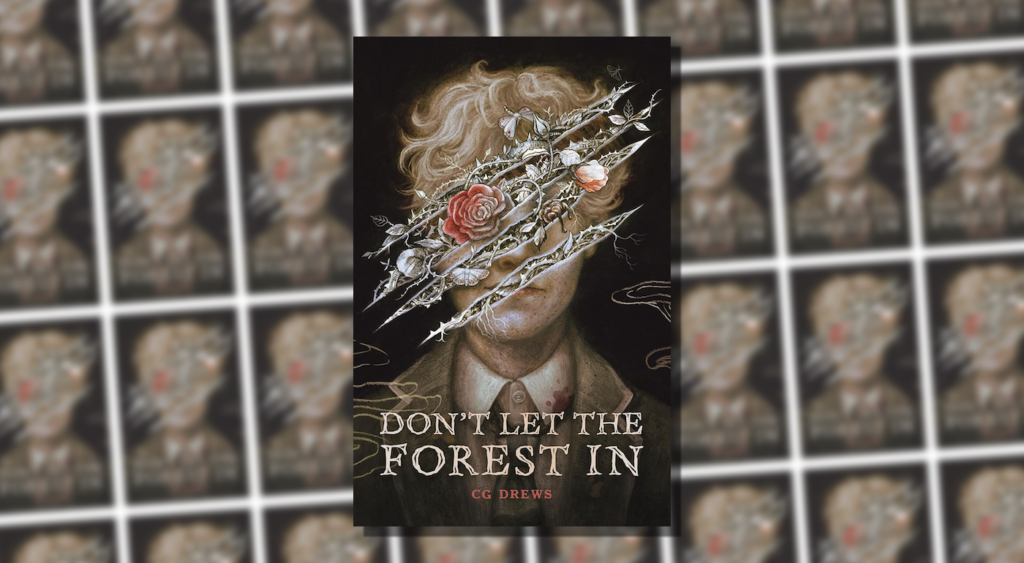[ad_1]
It’s senior year at Wickwood, a boarding school tangled in classical bourgeois traditions of the American northeast, all manicured lawns and handsome bullies, a world away from the world, tucked up against a forest that brims with terrible secrets. Andrew Perrault knows something awful happened at the end of last year. He’s got scars he can hardly remember getting, but he doesn’t want to think about it. He is, as usual, a mess. He’s a scattered, anxious, quiet thing, not like the hearth fire that is his more popular twin sister Dove. He just wants to finish out senior year alongside their best friend Thomas, an unapologetic, deeply charismatic artist boy who makes Andrew feel alive like nothing else can. Andrew pours his heart into writing dark and twisty fairytales, and Thomas draws them to life on the page. But upon their final arrival to Wickwood, something’s wrong. Dove’s avoiding Andrew for the first time ever, and Thomas seems to be keeping a secret—something bloody, and tender, and terrible. Andrew wants to help him. Andrew wants to save him, to protect him with his life and lay down his own for this boy, because the alternatives—losing him, or loving him aloud—are too terrible to imagine. Because Andrew does want Thomas, but he’s afraid Thomas wants Dove, and even if he did want Andrew back Andrew wouldn’t be enough—a boy like Thomas, he tells himself, is never going to be satisfied with only kissing, and Andrew knows he doesn’t want sex. Secrets, lies, and monsters come to life, and Thomas and Andrew must try to survive them—and each other.
Don’t Let the Forest In is an atmospheric mindfuck of good horror, a descent into madness or simply an awakening to it, the call coming from inside the house. CG Drews crafts a profoundly successful unreliable narrator. Lushly drawn with a gorgeous voice, this book revels in the sensory physicality of horror. Visceral, tangible, lingering on the smell and pressure of real and rotting things. The world-building is vivid and inviting, threaded with ominous, inviting foreshadowing. Drews renders Andrew and Thomas beautifully in relation to each other, a push-pull of adolescent codependence, its power and its pitfalls. A taut tangle of love and art and terror. The specific agony of closeted queer pining, and the way we can obsessively pour ourselves into our craft. The stories we tell ourselves in order to live, the stories we tell ourselves instead of doing the work of living, the stories we tell ourselves because the truth is anathema.
Drews knows how to turn a phrase, and the book moves at a satisfying pace with propulsive, inventive prose. As the forest creeps closer and Andrew’s grasp of reality falters, the text on the page slips sometimes—a bit of kerning play, the story taking on the shape of his fraying consciousness. And the art! This is a book I’m extra grateful to have read in physical form. Drews intersperses Andrew’s dark fairytales into the pages of the story, as well as Thomas’s macabre art, conjured by illustrator Jane Heidersdorf. It’s a brilliant choice, immersive and fitting—not only allowing the reader another dimension in which to experience the horrors, but literalizing the monstrosity creeping its way through Andrew’s consciousness.
The atmospheric horror also works so well with Andrew’s awfully accurate anxiety. This is rep that speaks to my own chronically anxious heart, all second-guessing and avoidance, driving himself wild with worst-case scenarios conjured from his deepest wants and worries. You can feel his fraying subconscious, the way chaos sometimes seems calmer than peace because at least chaos means you’re allowed to freak out; at least you can ascribe an external reason to your frightened heart. You don’t have to simply sit with it and figure out what is actually real, what is dangerous, and what is just… you.
Buy the Book


Don’t Let the Forest In
And gosh, I’m not an ownvoices reviewer for asexuality but from my outsider’s perspective this is a lovely, lovingly rendered exploration. Asexuality on the page is still a rare find, especially within queer romance and especially between queer boys, and this reads real and messy. Andrew uses the word asexual—I might also call him demiromantic—and Drews evokes this specific yearning with such clarity and compassion it makes me ache. Even though the horrors of the forest are truly terrifying, there’s so much comfort for queer readers built between these pages.
That said, speaking of comfort: Usually I’d like to avoid “spoilers” in my reviews for twists this significant, but in this case, I’m choosing to share what I wish I’d known going in. If you don’t want to know, you’re welcome to stop reading here or skip to the very last little paragraph.
SPOILER WARNING:
This is a grief book. Grief is listed among other content warnings for this title, but I didn’t realize just how much of a central role it would play. It’s elegantly done, braided effectively into classic horror’s workings with grief, but so much so I genuinely didn’t see it coming. It hit brutally when it did. If you can handle the painful twists in, say, The Haunting of Hill House or The Haunting of Bly Manor, then you probably don’t need my extra warning. This is an intentional choice for craft and effect, and I do think it’s effective—but as I wasn’t braced for a grief book, I don’t think it had the desired effect on me. Feels silly to say grief is one of my core triggers, but it is, in the sense that being confronted with profound grief as a shocking, devastating twist doesn’t delight me the way other plot twists do. It pulls me out of the story and into myself, as opposed to drawing me deeper in. This is a personal truth as a reader and a person that I know impacts my professionalism as a reviewer, so I choose to approach stories carefully based on how much grief is a factor, and the shape of its presence. Had I known this was a grief book, I would have approached with more caution and understanding—or, given my increased sensitivity to grief this month for various personal and political reasons, I might have opted out for the time being. So I offer you this information in case a book ultimately about the transformative monstrosity of grief isn’t what you need right now, and you were really looking for a beautiful gay book in which the horrors are not, in fact, traumatic manifestations of heartbreak and the devastating agony of loss.
AN EVEN BIGGER SPOILER AHEAD
Given the magnitude of the tragedy at the story’s core, the ending feels a bit rushed, unfinished. There are such enormous, spectacular twists so close to the end. Maybe I wouldn’t feel so jarred by them if there was more of a denouement, breathing room for the truth as much as the delusion, but it’s not that kind of book. Once I realized what, exactly, the story is about, Dove feels missing from what turns out to be her own story, reduced to a point of tension between the boys.
I understand what their relationship is, who she’s meant to represent for each of them. But if ultimately Dove is Andrew’s most significant relationship, I want to feel why, not just be told that it was true. This was a cinematic choice and I was emotionally attached on a literary level, which is to say by obscuring the specific genre I was reading I didn’t understand the stakes until it was too late. It’s sad, not just scary. Deep psychological trauma, not just creepy conjurings in the woods. The marketing had me prepared for two boys fighting eldritch horrors as well as their own feelings, not a raw, psychologically devastating exploration of loss.
Look, I love a grief book and I’m all for books leaving me heartbroken. But I don’t love grief as a plot twist, as a surprise. I like to know the shape of the wound I’m in for, and the content warning, promo material, and summary alone didn’t prepare me for that, so I’m preparing you. The only reason being that it impacted my experience of the book in an unwanted way, and I hope this means you get to experience it knowing what you’re in for, and in the right headspace, because twists like these can be profoundly cathartic, and I’m sure this is for some readers. And if you’re one of them and I just spoiled you—sorry! I said to skip, that’s all I can do. Because it feels worth it, for me, to keep this information in.
None of this takes away from how much I enjoyed reading the first three quarters of the book, or even from how fitting the brutal twists feel. It’s extremely effective for what it is, and even wishing for a bit more padding after the harsh landing of the climax, this was a triumphantly beautiful read and I love so very much of it. I’m extra sensitive to grief and loss right now, and I’m sharing this in case you are too. I like to know when I’m going into art that’s about confronting that, versus going into art for escapism.
END SPOILER WARNING
Don’t Let the Forest In becomes don’t look at just how much of a forest you’ve become: a haunted, violent thing, tendrils of secrets and crackling monstrosity. This is a beautiful book that succeeds in so much of what it sets out to do. Suspenseful and textured, a horrific meditation on grief, avoidance, and the profoundly transformative nature of loss. It presses thorns into the softest parts of your wounds and it almost feels like a kiss.
Don’t Let the Forest In is published by Feiwel & Friends.
[ad_2]
Source link

